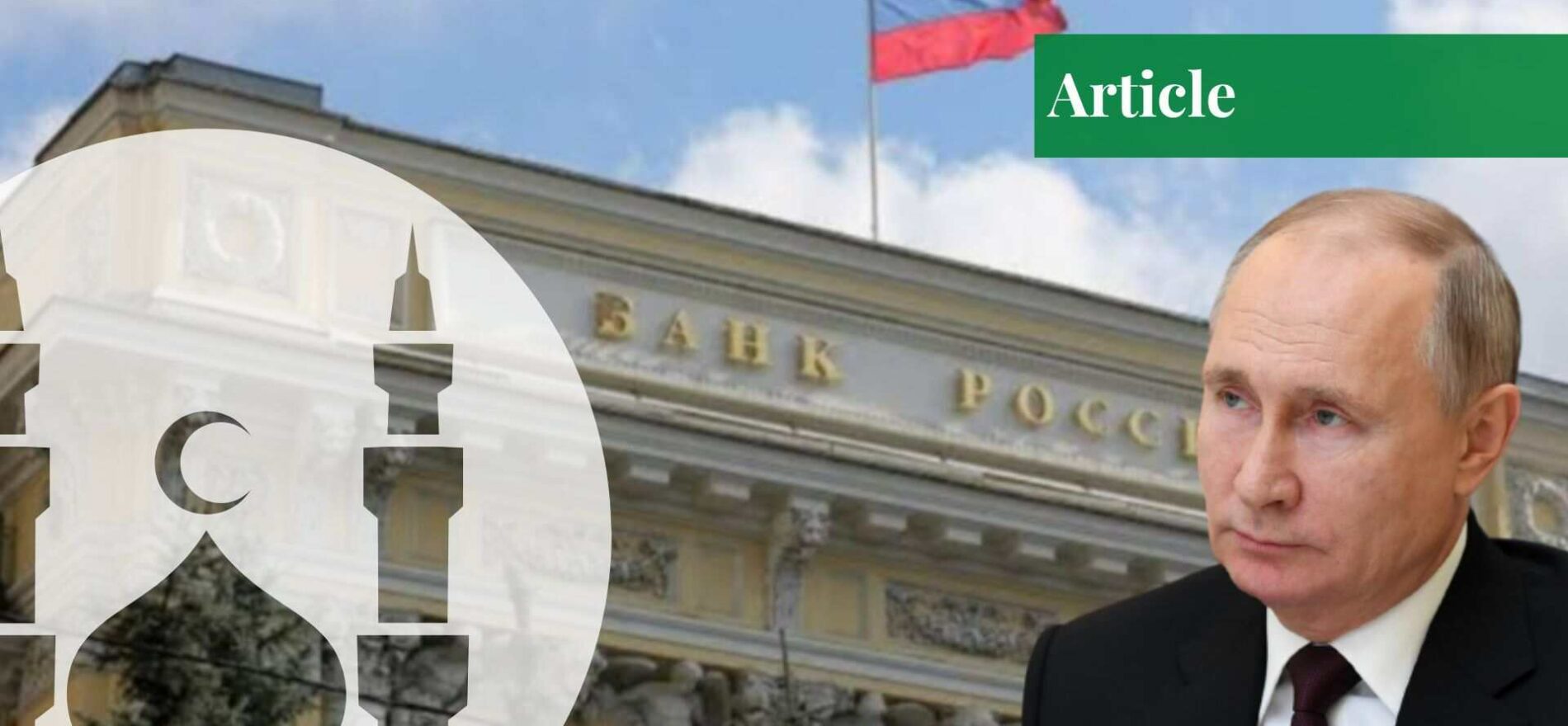Ms Fizza Batool is a student of International Relations from Kinnaird College for Women. She is particularly interested in geo-economics, geopolitics, area studies, diplomacy, conflict and peace, strategic and defense studies, political economy, and global politics of the environment.
The East-West Divide
The struggle between the Eastern and Western financial systems has been a complex and developing narrative. Along with financial prowess, the competition also takes into account geopolitical clout, business partnerships, and the reshaping of international relations. Russia has played a varied role in this conflict, reflecting its geopolitical orientation as a link between the East and the West.
The banking system is crucial to international relations as it facilitates and reflects relationships in the world’s economy. The International Monetary Fund (IMF) and the World Bank are two examples of the complex network of financial institutions that make up the international banking system. Central banks, commercial banks, and other international organizations are also included. These organizations work together to enable cross-border money, trade, and investment movements, acting as the foundation of global financial activities.
Due to historical, cultural, and economic differences, the banking systems in the East and West are very different from one another. The financial system is distinguished by its complexity, well-established regulatory frameworks, and emphasis on transparency in the Western setting. Significant sway over monetary policy is exerted by central banks like the European Central Bank and the Federal Reserve in the United States.
The global financial environment is dominated by Western institutions, which are typically networked and frequently impose their regulatory norms on cross-border operations. A history of colonial expansion and economic hegemony has aided in this domination.
The East, on the other hand, is mostly represented by Asia and has a varied financial environment with differing degrees of development. In an effort to modernize and go global, emerging economies like China and India are quickly growing their financial sectors. Confucian principles and government intervention have historically shaped the Eastern financial system, favoring stability above speculative endeavors.
Although some Eastern countries are expanding their markets and incorporating Western norms, regional banking inequalities and traces of governmental control still exist. To lessen reliance on Western-controlled channels, Russia has sought to enhance its own financial infrastructure, encourage the use of its currency (the ruble) in bilateral trade deals, and create alternative payment methods.
The Genesis of Islamic Banking in International Relations
Islamic banking in the context of international relations has its origins in both ethical and practical economic concepts. The necessity for financial systems that adhere to Islamic principles, which forbid the charging of interest (usury) and promote moral and ethical financial behavior, gave rise to the development of Islamic banking. This distinct method of handling money has become well-known all across the world, including in Russia, where it reflects wider attempts to diversify the nation’s economic relations and interact with countries with a Muslim majority.
The concepts of Islamic banking are based on Islamic law (Sharia) and revolve around the idea of risk-sharing, where both gains and losses are distributed among participants. As opposed to traditional interest-based banking, this. In the 20th century, Islamic banking expanded rapidly, especially in the 1970s when oil-rich Muslim nations wanted to set up financial organizations that followed Islamic precepts. These organizations provided a fresh approach to banking that was in line with the ideals of a sizeable chunk of the world’s people.
Russia and its Economic Ties with Muslim Countries
Russian trade with Islamic nations has changed throughout time as a result of a mix of geopolitical factors, economic diversification, and initiatives to enter new markets. Although certain obstacles have also surfaced, affecting the effectiveness and simplicity of commerce, Russia’s current financial system has contributed to making trading with these nations easier.

Russia’s relations with Islamic nations have spanned a variety of industries, including energy, infrastructure, defense, and agriculture. Given Russia’s historical preference for European markets, the diversification of economic alliances is especially important. Islamic nations, which include those in the Middle East, North Africa, and some regions of Asia, present chances for Russia to expand its exports of products and services, draw foreign investment, and foster diplomatic relations.
The main channel for trading with Islamic nations has been Russia’s banking system so far, which focused on its own currency, the ruble. However, this reliance on the ruble proved to be problematic for foreign trade. Many Islamic nations choose to transact business using their own currencies or well-known global currencies like the US dollar or the euro. This imbalance affected the total amount of commerce and made trade discussions more difficult.
Russian Intervention in Ukraine: Economic Repercussions
Significant effects of intervening in Ukraine have been felt by Russia’s banking industry and economy. Economic sanctions imposed by Western nations as a result of the war, which started in 2014 with Russia’s annexation of Crimea and support for separatist forces in eastern Ukraine, have had a significant negative impact on Russia’s economic environment. The targets of these sanctions were Russia’s oil, financial, and defense industries.
Russian banks found it more difficult to get capital and complete foreign transactions due to constraints on their ability to access global financial markets and technology. These restrictions reduced investor trust, discouraged foreign investment, and aided in the exodus of capital from the nation. Sanctions and the resulting economic slowdown made financing less readily available and increased borrowing prices for Russian companies. Concerns over inflation and financial stability were increased by the loss of the Russian ruble, which made things even more difficult.
Development of the Islamic Banking System by Russia
Despite being well-established, Russia’s traditional banking sector has had difficulties due to Western economic sanctions, which forced the country to look for new trading partners. Islamic banking provided a chance to interact with Muslim-majority nations on financial and economic issues since its guiding principles are in line with Sharia law. Russia sought to increase economic ties, draw investment from these countries, and promote financial inclusion for its own Muslim community through the incorporation of Islamic finance methods.

Economic diversification and the desire to enter new markets, particularly in the Middle East and North Africa, were the main drivers behind the concept of implementing Islamic banking in Russia. Middle Eastern and North African nations, including Saudi Arabia, the United Arab Emirates, and Qatar, are among the prospective partners that Russia sought to pursue in relation to Islamic banking. These countries are possible allies for Russia’s investigation of this economic strategy since they have substantial financial resources and knowledge of Islamic finance.
Starting at the regional level, the Russian parliament has passed a measure to establish Islamic banking in four regions that are predominately populated by Muslims: Chechnya, Daghestan, Tatarstan, and Bashkortostan. The implementation of Islamic banking in Russia is viewed as a means of luring foreign capital and accelerating economic growth in the regions with a Muslim majority. It is also viewed as a strategy to accommodate Russia’s expanding Muslim population.
Merit Assumptions of Islamic Banking for Russia’s Economy
Russia, through a well-established international Islamic banking system, could enjoy the merits that have the potential to fuel its economy. Following are some assumptions designated for Russia’s economic growth through Islamic banking:
- Diversification of finance sources: Islamic banking would provide Russian enterprises and projects another source of finance. By utilizing Islamic banking, Russia might get access to funds from nations with a Muslim majority and investors who favor financial products that adhere to Sharia law, possibly lessening its reliance on conventional Western funding avenues.
- Attracting Foreign Direct Investment: Islamic nations seeking to make investments that adhere to their moral and religious standards may invest in Islamic finance because of its moral character and asset-backed status. This may inject the necessary funds into a number of Russian economic sectors, promoting development and prosperity.
- Enhanced economic relations: Using Islamic finance to interact with Islamic nations may improve economic ties and participating in Islamic banking might help trade talks and transactions run more smoothly since many nations with a majority of Muslims desire to do business in ways that are consistent with their moral principles.
- Financial inclusion: Fairness, transparency, and the avoidance of exploitative practices are stressed by Islamic banking’s guiding principles. Offering services to demographic groups who might have historically been underserved or excluded from the formal banking system could encourage financial inclusion.
- Risk-sharing mechanisms: The foundation of Islamic finance is risk sharing, where parties split profits and losses. The likelihood of speculative bubbles and financial crises may decrease as a result of this concept, which encourages a more careful and responsible attitude to financial transactions.
- Ethical and socially responsible financial practices: Islamic banking abides by moral standards and shuns investments in gambling, alcohol, and other speculative industries. Russian adoption of Islamic money might encourage ethical purchasing and economic conduct, in line with global trends toward sustainable finance.
- Geopolitical diversification: Adopting Islamic banking might pave the way for new economic ties and collaborations with nations in the Middle East, North Africa, and Asia, given Russia’s geopolitical considerations and disputes with Western nations. This diversification could make Russia’s economy more resilient and less susceptible to external forces.
- Competitive advantage: Russia may have an advantage in luring Islamic finance-related companies and activities if it adopts Islamic banking early in the area. This may establish the federation as a center for Islamic finance services in the Eurasian region.
Conclusion
Following ratification by the Russian parliament, Islamic banking is going to be permitted for a two-year trial program in four areas (Bashkortostan, Chechnya, Daghestan, and Tatarstan) beginning on 1st September 2023. This has led to a renewed concurrence over the growth of Russia’s financial system.
While the US dollar-dominated Western banking system wields considerable worldwide sway, Russia’s investigation of Islamic banking demonstrates its readiness to accept different financial models and collaborate with a wide range of economic partners. Russia seeks to strengthen its economic resilience and negotiate the intricate web of international relations by expanding its commercial links and engaging with Islamic nations.
The adoption of Islamic banking principles shows how adaptable Russia is to shifting economic dynamics and a wider range of financial products. Russia’s involvement in Islamic banking, which adds to the complex web of economic exchanges and alliances on the international stage as global dynamics change, demonstrates the country’s ability to carve its own niche in the world of finance.
If you want to submit your articles, research papers, and book reviews, please check the Submissions page.
The views and opinions expressed in this article/paper are the author’s own and do not necessarily reflect the editorial position of Paradigm Shift.



















